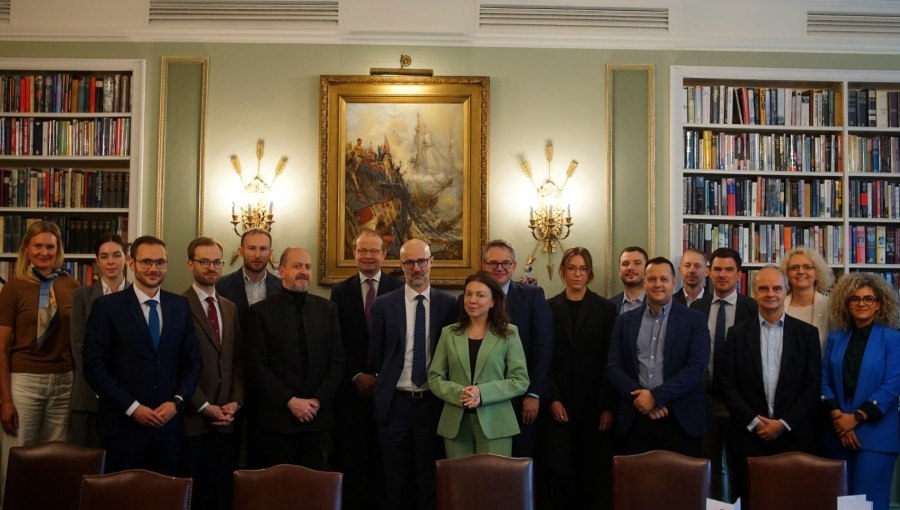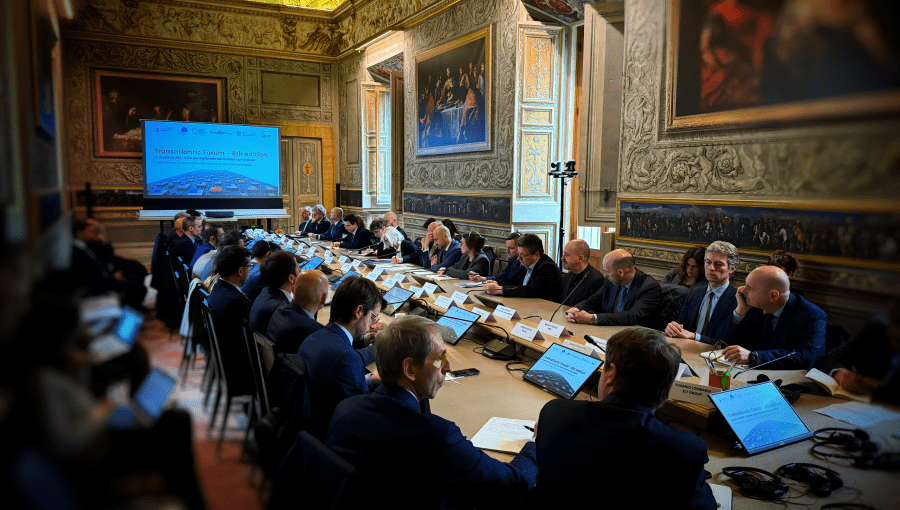Experts Gather at JCU to Discuss Disinformation and AI in Elections
On May 20, 2024, a panel of distinguished experts convened at John Cabot University’s Guarini Campus to discuss the critical topic of “Disinformation and Elections in the Age of AI-Generated Content.” This timely roundtable, held in the Aula Magna Regina, brought together policymakers, journalists, media experts, technologists, and scholars to address the growing concerns surrounding disinformation in democratic processes.

The event, organized by the John Cabot University Institute of Future and Innovation Studies, in collaboration with the Guarini Institute for Public Affairs at John Cabot University and the Center for American Studies, marks an important contribution to the ongoing discussion centered on the multifaceted challenges posed by new data systems and AI technologies in the context of elections and public discourse.
The experts painted a complex picture of the digital landscape and its impact on democratic processes, describing an interconnected web of challenges that have emerged with the rise of new data systems and AI technologies. In this new reality, online platforms often create echo chambers that reinforce existing beliefs, potentially exacerbating polarization and contributing to a post-truth political environment where emotional appeals frequently overshadow objective facts. This situation is further complicated by what experts term “infodemics” – the rapid spread of both accurate and inaccurate information, making it increasingly difficult for the public to separate truth from falsehood. The rise of deepfakes, highly convincing AI-generated audio and video content, adds another layer of complexity to this information disorder.
At the heart of this issue are algorithmic gatekeepers – AI systems and global digital platforms that algorithmically curate and distribute information, potentially reinforcing biases or limiting exposure to diverse viewpoints. The increasing sophistication of synthetic AI, capable of mimicking human communication, poses additional challenges to discerning authentic content from artificial constructs. These developments collectively present a significant challenge to professional journalism, threatening traditional methods of news gathering and reporting.
The experts noted a concerning lack of standards and regulations governing the use of AI in information dissemination, as well as an absence of reliable trust architectures for verifying the authenticity of digital content, particularly images. Underpinning all these issues is the fundamental problem of data quality. The accuracy and reliability of the data used to train AI systems are crucial, as flawed data can lead to biased or inaccurate outputs, further muddying the waters of public discourse. This multifaceted challenge requires a comprehensive approach, combining technological solutions, policy interventions, and public education to safeguard the integrity of democratic processes in the age of AI.
While these challenges paint a concerning picture, the experts also highlighted potential positive applications of AI in combating disinformation. These include content verification tools, automated fact-checking systems, and advanced sentiment and network analysis capabilities that could help identify and mitigate the spread of false information. The roundtable emphasized that while disinformation has been a persistent issue throughout history, the advent of AI-generated content presents a new level of sophistication in potential threats to electoral integrity. However, it also offers innovative solutions to counter these very threats.
The diverse panel of experts, including representatives from the European Commission, academic institutions, media organizations, and technology companies, underscored the need for a multidisciplinary approach to addressing these challenges. Their collective expertise provided valuable insights into the complex interplay between technology, politics, and public discourse in the modern era. As democracies worldwide face crucial elections, this roundtable serves as a crucial step in fostering public debate and developing comprehensive strategies to leverage digital and AI capabilities. The goal is not only to combat disinformation but also to enhance public participation and access to fair information during elections, ultimately safeguarding the democratic process in the age of artificial intelligence.
Roundtable Participants
Francesco Lapenta (lead-organizer and moderator)
Patrizia Feletig, President of Associazione Copernicani (co-organizer)
Barbara Ottaviani Jones, John Cabot University (co-organizer)
Paul Nemitz, Principal Adviser on the Digital Transition, DG Justice and Consumers, European Commission Renuka Singh, Centre for the Study of Social Systems, School of Social Sciences, Jawaharlal Nehru University, New Delhi
Antonio Malaschini, Ministry of Economy and Finance, Center for American Studies
Richard Alo, Dean – Florida A&M University
Enrico Prati, National Research Council, Università degli studi di Milano, Center for American Studies in Rome
Giorgio Rutelli, Vice-Director of Adnkronos
Mimmo Squillace, President at UNINFO, Executive Coordinator at IBM Italy
Gianluca Misuraca, Executive Director at AI4GOV
Vittorio Calaprice, European Commission in Italy, Digital Business Intelligence and Political Analyst
Serena Giusti, Scuola Superiore Sant’Anna
Yohn Jairo Parra Bautista Florida A&M University
Carlos Theran, Florida A&M University
Pierre D. Ngnepieba, Florida A&M university
A special thank you to Director Roberto Sgalla and the supporting team at the center for american Studies.





